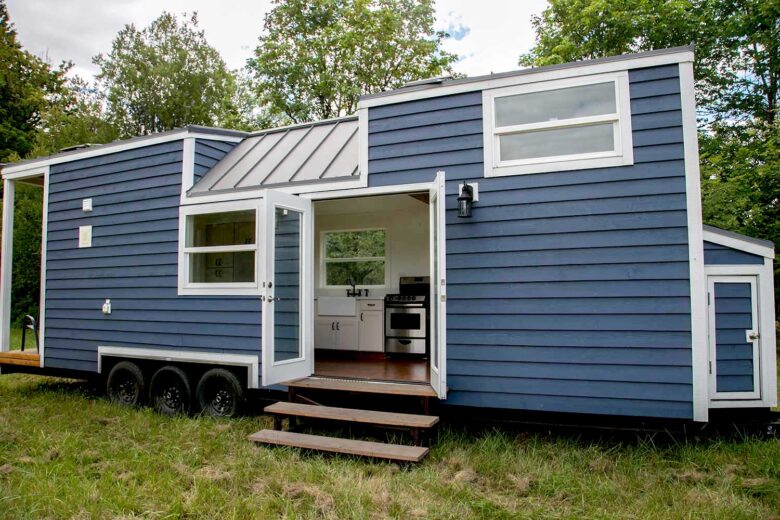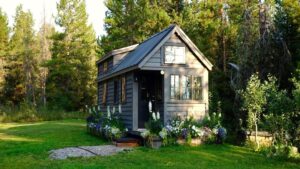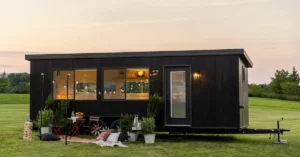Many people are attracted to the idea of living in a tiny house on wheels (THOW) because of the freedom, lower carbon footprint, and simplicity it offers. This lifestyle appeals to people who want to significantly reduce their living space and still want to be able to move freely at any time. Buying your first THOW requires specific considerations that differ from a standard home purchase, including extensive research, planning, and thinking about your lifestyle needs.
Learn About the Concept of Tiny Houses on Wheels:
Tiny Houses on Wheels combines the compact economy of a tiny house with the mobility of an RV to create a home that can roam. This mobility allows owners to experiment with different living arrangements and lifestyles without being limited to a specific real estate parcel. This concept is especially attractive for those who like to travel or want to change their environment regularly without having to pack and move.
Evaluate Your Lifestyle Compatibility:
Potential buyers of THOW should carefully consider their suitability for a downsizing lifestyle. This includes determining tolerance for smaller living spaces, the ability to keep belongings to a minimum, and preparing for the tight spaces that living in a small house brings. This transition can be difficult for people used to more space, but it can be worth it in terms of simplicity and low maintenance.
Explore Design and Customization Options:
Choosing THOW means choosing a design that meets aesthetic and functional requirements. Many builders offer customizable options that allow buyers to choose the layout, materials, and built-in features. Foldable furniture, vertical storage solutions, and multi-functional spaces are all important aspects that prioritize maximizing space use.
Consider Budget and Financing:
THOW costs vary widely depending on size, materials, and customization. Developing a budget and investigating financing options are core tasks. While some may be able to pay the full amount, others may need financing, which is more difficult for THOWs than typical homes because they are classified as vehicles rather than real estate.
Research Legality and Zoning:
THOW One of the most difficult aspects of life is dealing with zoning restrictions and building codes. Potential owners should research the rules regarding where and how a THOW may be parked and occupied. Some areas have embraced tiny homes and created special areas or communities for them, while others still have strict views on living in what is legally classified as an RV.
Choose a Reliable Builder:
Choosing a respected builder is essential to ensure that your THOW is safe, well-built, and meets all legal standards for road travel and accommodation. Potential buyers should research the builder, read reviews from previous customers, and ensure that the builder meets building codes for tiny houses on wheels.
Mobility Plan:
Owning a THOW also requires planning for its transportation. This includes understanding towing requirements, such as the type of vehicle required and any specific driver’s licence or permit. Regular maintenance inspections are necessary to ensure the home is roadworthy when moved.
Transition to Small Life:
Preparing for life in a THOW requires more than just buying a home. Prospective owners need to prepare for the move, including how to downsize their belongings, maximize interior space, and adapt to the special challenges and benefits of compact living. This could mean trying to live in a smaller place or renting a THOW for a short period to get familiar with the lifestyle firsthand.
Connect with the Tiny House Community:
Newcomers can find support, advice, and camaraderie by participating in this small family community. There are many online communities and forums where both experienced THOW residents and newbies can share advice, experiences, and resources. This community is very useful for overcoming the first obstacles in life.
Think About the Impact on the Environment:
Finally, evaluate the impact of the THOW lifestyle on the environment. While tiny homes are often praised for their lower environmental impact, the actual impact varies based on factors such as the materials used, frequency of moves, and waste management methods. Potential buyers should try to make decisions that support sustainable living habits.
Conclusion:
Buying THOW is more than just a purchase; it represents a commitment to a lifestyle. Those who choose this path are often motivated by a desire for a simpler, more customisable lifestyle that conflicts with traditional family values. If you plan carefully, make smart choices, and are willing to embrace a new lifestyle, buying your first tiny home on wheels can be the start of an exciting and rewarding adventure.
FAQs:
1. What should I consider when choosing a builder for my tiny house on wheels?
Find an experienced and reliable small home builder. Check out reviews, ask for recommendations, and view their portfolio of completed work. Make sure they understand local THOW codes and standards and can tailor the design to your specific requirements and tastes.
2. How do I find the best place to park my tiny house on wheels?
When choosing the details of your ideal location, consider legalities, amenities, and surrounding communities. In some areas, parks or cities have been developed specifically for small homes. When choosing a location, consider variables such as proximity to work, natural surroundings, municipal restrictions,, and utility use.
3. What are the challenges of living in a compact house on wheels?
Challenges include limited space, the need for frequent maintenance, managing zoning restrictions, and lifestyle adjustments to accommodate downsizing. Due to the fluid nature of THOW, you may often need to secure legal parking and living space in front of your home.
4. How do I secure my tiny house on wheels?
Insuring a THOW can be difficult because it falls into a different category than homes and cars. Look for an insurance company that offers specialized insurance for small homes that cover structure and mobility. If you plan to move frequently, make sure your coverage covers transportation and multiple locations.
5. What amenities are needed for a tiny house on wheels?
THOW usually provides water, electricity, and sewerage. Off-grid living solutions range from standard caravan park connections to self-sufficient units, including solar panels, compost toilets, and water tanks.
6. How can I make my tiny house on wheels environmentally friendly?
Consider using sustainable building materials, solar panels, LED lighting, and energy-efficient appliances to make your THOW more environmentally friendly. Compost toilets and rainwater harvesting systems are other effective ways to reduce water waste and promote sustainability.



